The car is hot and sticky, even though it’s barely the beginning of summer. After a day on the road, you roll the window down and turn up the radio, as you really want to be 100% alert for what you are about to see.
As we drive out towards Spanish Point on the Clare coast, coming over the brow of a hill, suddenly it comes into view. That first magnificent glimpse of the sea in the evening sunshine.
Even just seeing the ocean invigorates us. It almost has a magnetic pull.
What is it about the sea that draws people to it? It’s kind of an intangible thing, really.
Mysterious as the pull of the ocean may be, someone who knows it only too well is June Curtin.
June is the woman behind Snámhaí Sásta. A sea-swimming community, or tribe as she likes to call it, based at Spanish Point Beach.
Snámhaí Sásta, however, is not a swimming club. There’s no formal membership, red tape or any of that. It’s a group of people, all welcome, who meet each morning at quarter past nine to swim in the sea. This gathering is less about swimming and more about community, friendship and support.
Dipping toes
Sitting down on a bench in the beach carpark for a chat with June, she tells of how Snámhaí Sásta came to be. Unfortunately, the catalyst for Snámhaí Sásta is not a happy one.
“In August 2013, I lost my husband John to suicide,” June begins.
“My children were five and nine at the time, so it was very difficult. The years that followed were very difficult. I put a lot of time and energy into minding my children. I was always of the assumption that if my children were OK, then I’d be OK, but as a result I kind of neglected myself.
“They were keeping me going and two years ago then I was suffering badly from stress and anxiety. I tried lots of different things. I walked, I had gone to the gym, I had done yoga, but nothing seemed to be working for me.”
June grew up here and still lives only two minutes away. From our vantage point, we can see the Armada Hotel, her family’s business. Her brother John Burke, married to Aoibhín Garrihy, runs it now.
It was in 2019, in the Armada, that the idea of swimming in the sea first came to June.
“I was sitting in the Armada having a cup of tea, looking out at the ocean and I decided that I would go for a swim the following morning,” June recalls. “The only problem was that I can’t swim, but at this stage for me it was sink or swim. I had two small children to think of. I had to be well. If I wasn’t well, I couldn’t look after my children.
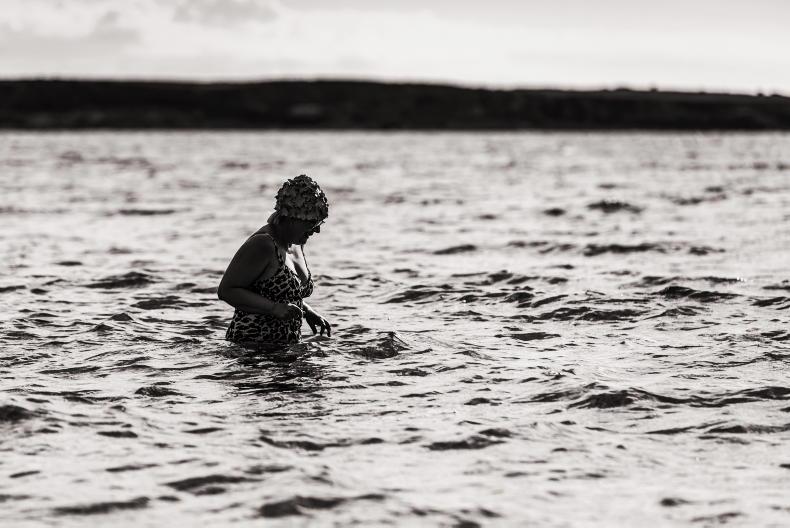
Snámhaí Sásta is less about swimming and more about community, friendship and support. \ Philip Doyle
“I went for a swim the following morning at nine o’clock, and God, I just felt so good. I felt like I could take on anything that came at me that day. You get into the freezing cold water and all you can think about at the time are the waves coming at you. It was great. I decided there and then I was going to do it daily.”
To hold encourage herself to complete this daily ritual, June posted on Facebook about it, to see if anyone would like to join.
“A local woman from Spanish Point actually saw the post and said she would get in with me on day two. So there were two of us on day two,” June says. “I set up an Instagram page, @snamhaisasta, then. I think from there it started to grow probably. Word of mouth too, people started to come and do the swim, they were telling other people. It grew from that.
“Last year we celebrated Snámhaí Sásta’s first birthday and there were loads of us on the beach. They had come from the four corners of Ireland, literally, to join us, which was wonderful. Snámhaí Sásta is more about community. The camaraderie is just infectious.”
Making a splash
On this sunny evening, naturally, the beach is busy. People constantly salute June and she calls back to them.
June is currently learning how to swim, but safety first, she stays well within her depth. As June explains, swimming actually is not an important part of this ritual, more so just getting in the water and connecting with people.
“It doesn’t matter what age you are, what colour your skin is, what size you are,” June says. “I know my mom got into the sea for the first time in a very long time last year. She was very conscious, because she said: ‘They’ll all be looking at me.’ I said: ‘The funny thing is, nobody looks at anybody down here. Only just to make sure that you’re smiling and you’re happy.’ That’s the most important thing. It’s not about what size you are, that’s irrelevant. Lumps and bumps, they don’t matter.”
During the most recent 5km travel restrictions, there was core group of about 10 swimmers who got in every day. But with more movement around the country now, there could be any amount of people on any given day. Pre-COVID-19, they had breakfast of a Sunday morning on the beach and sometimes music and dancing.
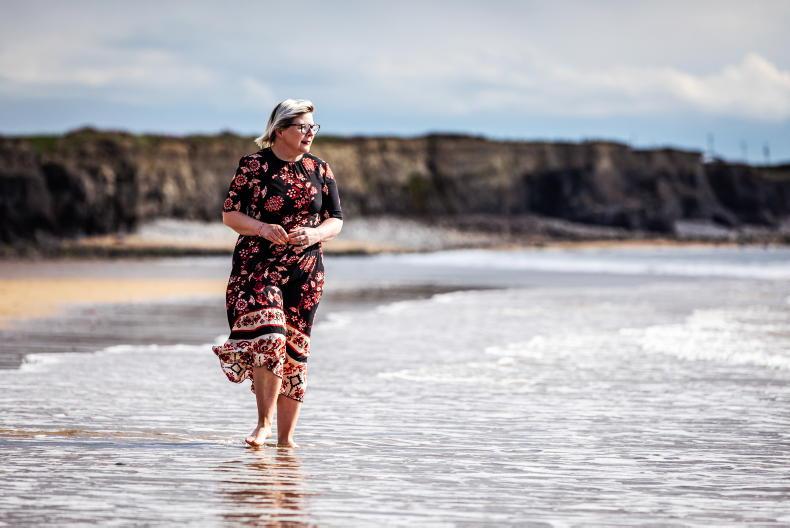
June Curtain started sea swimming to keep herself well. \ Philip Doyle
People come from all over the country to swim with June and be a part of the Snámhaí Sásta tribe. When this writer tells a friend from Kildare she is going to Clare to do an article on sea swimming, she is met with: “Is that the Snámhaí Sásta lady you’re interviewing? I really want to go down and swim with them sometime.”
Given her presence with Snámhaí Sásta, people often reach out to June for help and advice. June feels that everyone has their own personal reasons for coming to the tribe.
“I think everybody has their own reason for joining,” June explains. “I always say that nobody escapes this life without walking a step in pain. Although you may not see it sometimes, every day I meet people who are in very difficult situations and they look perfectly fine, but everybody gets hit with something. I think the sea is a great help.
“Life is very fragile and unpredictable. No one knows what is around the corner, so it’s all about helping each other where you can. Lifting each other up and trying to focus on the positives.
“Everybody has their own story. If I can help somebody, I will, because my own story has made me look at life very differently. I’m hugely conscious of gratitude now. I’m grateful for all that I have and I try not to think about the things that I don’t have.”
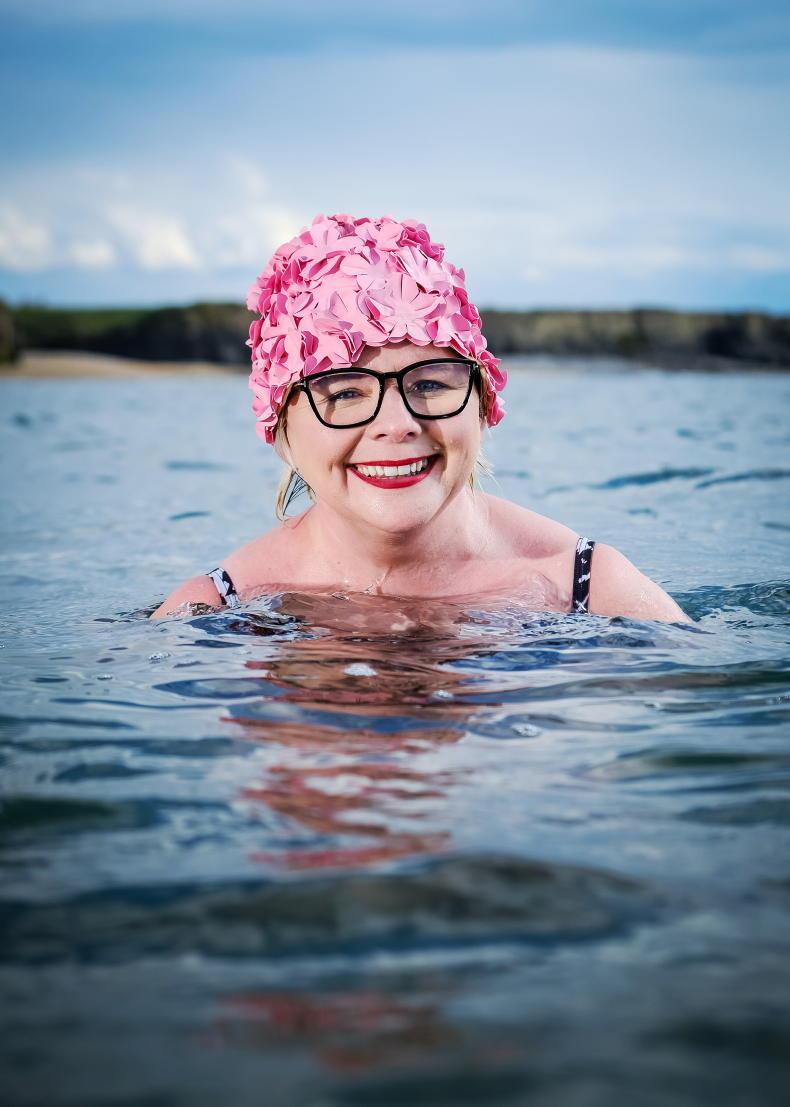
People come from all over the country to swim with June Curtin and the Snámhaí Sásta group. \ Philip Doyle
Seeing is believing, they say. So of course, we must test out June’s feel-good theory about the sea. June, Philip the photographer (armed with cameras and lights) and I, all enter the water. With the pictures taken (miraculously, no equipment damaged) we splash around for a bit.
Sure enough, we feel great afterwards. A lightness, a freeness – that intangible feeling.
June swims every day. Sometimes twice. For the month of December, she swam three times a day, every day, in the process raising €14,000 for the Mid West Simon Community, a homeless charity.
“I still get something from it every day. The healing powers of the sea are just phenomenal. I see it with different people, new people coming and they come out of the water a different person almost.
“Snámhaí Sásta will continue for as long as I’m able, anyway. We’ll keep at the swimming every morning, keep promoting the benefits of sea swimming, promoting the importance of minding your mental health and asking for help if you’re struggling, because there’s always someone willing to listen.”
Driving away from the Clare coast, the car is cool and airy. And everything is just that little bit brighter.
Water poses a risk in all its forms, from the barrel out the back, to lakes, rivers and the sea. Swimming in open water is dangerous. Don’t take chances, don’t swim in areas you don’t know and don’t swim alone. For more information see www.watersafety.ie. For a list of lifeguarded beaches around the country see www.watersafety.ie/lifeguards/
If you have been affected by any of the issues raised in this article you can free phone the Samaritans on 116 123.
Read more
The world of water with ice swimmer Nuala Moore
'Whether you’re from Timbuktu or Tipperary, running is something we can all do'
The car is hot and sticky, even though it’s barely the beginning of summer. After a day on the road, you roll the window down and turn up the radio, as you really want to be 100% alert for what you are about to see.
As we drive out towards Spanish Point on the Clare coast, coming over the brow of a hill, suddenly it comes into view. That first magnificent glimpse of the sea in the evening sunshine.
Even just seeing the ocean invigorates us. It almost has a magnetic pull.
What is it about the sea that draws people to it? It’s kind of an intangible thing, really.
Mysterious as the pull of the ocean may be, someone who knows it only too well is June Curtin.
June is the woman behind Snámhaí Sásta. A sea-swimming community, or tribe as she likes to call it, based at Spanish Point Beach.
Snámhaí Sásta, however, is not a swimming club. There’s no formal membership, red tape or any of that. It’s a group of people, all welcome, who meet each morning at quarter past nine to swim in the sea. This gathering is less about swimming and more about community, friendship and support.
Dipping toes
Sitting down on a bench in the beach carpark for a chat with June, she tells of how Snámhaí Sásta came to be. Unfortunately, the catalyst for Snámhaí Sásta is not a happy one.
“In August 2013, I lost my husband John to suicide,” June begins.
“My children were five and nine at the time, so it was very difficult. The years that followed were very difficult. I put a lot of time and energy into minding my children. I was always of the assumption that if my children were OK, then I’d be OK, but as a result I kind of neglected myself.
“They were keeping me going and two years ago then I was suffering badly from stress and anxiety. I tried lots of different things. I walked, I had gone to the gym, I had done yoga, but nothing seemed to be working for me.”
June grew up here and still lives only two minutes away. From our vantage point, we can see the Armada Hotel, her family’s business. Her brother John Burke, married to Aoibhín Garrihy, runs it now.
It was in 2019, in the Armada, that the idea of swimming in the sea first came to June.
“I was sitting in the Armada having a cup of tea, looking out at the ocean and I decided that I would go for a swim the following morning,” June recalls. “The only problem was that I can’t swim, but at this stage for me it was sink or swim. I had two small children to think of. I had to be well. If I wasn’t well, I couldn’t look after my children.

Snámhaí Sásta is less about swimming and more about community, friendship and support. \ Philip Doyle
“I went for a swim the following morning at nine o’clock, and God, I just felt so good. I felt like I could take on anything that came at me that day. You get into the freezing cold water and all you can think about at the time are the waves coming at you. It was great. I decided there and then I was going to do it daily.”
To hold encourage herself to complete this daily ritual, June posted on Facebook about it, to see if anyone would like to join.
“A local woman from Spanish Point actually saw the post and said she would get in with me on day two. So there were two of us on day two,” June says. “I set up an Instagram page, @snamhaisasta, then. I think from there it started to grow probably. Word of mouth too, people started to come and do the swim, they were telling other people. It grew from that.
“Last year we celebrated Snámhaí Sásta’s first birthday and there were loads of us on the beach. They had come from the four corners of Ireland, literally, to join us, which was wonderful. Snámhaí Sásta is more about community. The camaraderie is just infectious.”
Making a splash
On this sunny evening, naturally, the beach is busy. People constantly salute June and she calls back to them.
June is currently learning how to swim, but safety first, she stays well within her depth. As June explains, swimming actually is not an important part of this ritual, more so just getting in the water and connecting with people.
“It doesn’t matter what age you are, what colour your skin is, what size you are,” June says. “I know my mom got into the sea for the first time in a very long time last year. She was very conscious, because she said: ‘They’ll all be looking at me.’ I said: ‘The funny thing is, nobody looks at anybody down here. Only just to make sure that you’re smiling and you’re happy.’ That’s the most important thing. It’s not about what size you are, that’s irrelevant. Lumps and bumps, they don’t matter.”
During the most recent 5km travel restrictions, there was core group of about 10 swimmers who got in every day. But with more movement around the country now, there could be any amount of people on any given day. Pre-COVID-19, they had breakfast of a Sunday morning on the beach and sometimes music and dancing.

June Curtain started sea swimming to keep herself well. \ Philip Doyle
People come from all over the country to swim with June and be a part of the Snámhaí Sásta tribe. When this writer tells a friend from Kildare she is going to Clare to do an article on sea swimming, she is met with: “Is that the Snámhaí Sásta lady you’re interviewing? I really want to go down and swim with them sometime.”
Given her presence with Snámhaí Sásta, people often reach out to June for help and advice. June feels that everyone has their own personal reasons for coming to the tribe.
“I think everybody has their own reason for joining,” June explains. “I always say that nobody escapes this life without walking a step in pain. Although you may not see it sometimes, every day I meet people who are in very difficult situations and they look perfectly fine, but everybody gets hit with something. I think the sea is a great help.
“Life is very fragile and unpredictable. No one knows what is around the corner, so it’s all about helping each other where you can. Lifting each other up and trying to focus on the positives.
“Everybody has their own story. If I can help somebody, I will, because my own story has made me look at life very differently. I’m hugely conscious of gratitude now. I’m grateful for all that I have and I try not to think about the things that I don’t have.”

People come from all over the country to swim with June Curtin and the Snámhaí Sásta group. \ Philip Doyle
Seeing is believing, they say. So of course, we must test out June’s feel-good theory about the sea. June, Philip the photographer (armed with cameras and lights) and I, all enter the water. With the pictures taken (miraculously, no equipment damaged) we splash around for a bit.
Sure enough, we feel great afterwards. A lightness, a freeness – that intangible feeling.
June swims every day. Sometimes twice. For the month of December, she swam three times a day, every day, in the process raising €14,000 for the Mid West Simon Community, a homeless charity.
“I still get something from it every day. The healing powers of the sea are just phenomenal. I see it with different people, new people coming and they come out of the water a different person almost.
“Snámhaí Sásta will continue for as long as I’m able, anyway. We’ll keep at the swimming every morning, keep promoting the benefits of sea swimming, promoting the importance of minding your mental health and asking for help if you’re struggling, because there’s always someone willing to listen.”
Driving away from the Clare coast, the car is cool and airy. And everything is just that little bit brighter.
Water poses a risk in all its forms, from the barrel out the back, to lakes, rivers and the sea. Swimming in open water is dangerous. Don’t take chances, don’t swim in areas you don’t know and don’t swim alone. For more information see www.watersafety.ie. For a list of lifeguarded beaches around the country see www.watersafety.ie/lifeguards/
If you have been affected by any of the issues raised in this article you can free phone the Samaritans on 116 123.
Read more
The world of water with ice swimmer Nuala Moore
'Whether you’re from Timbuktu or Tipperary, running is something we can all do'








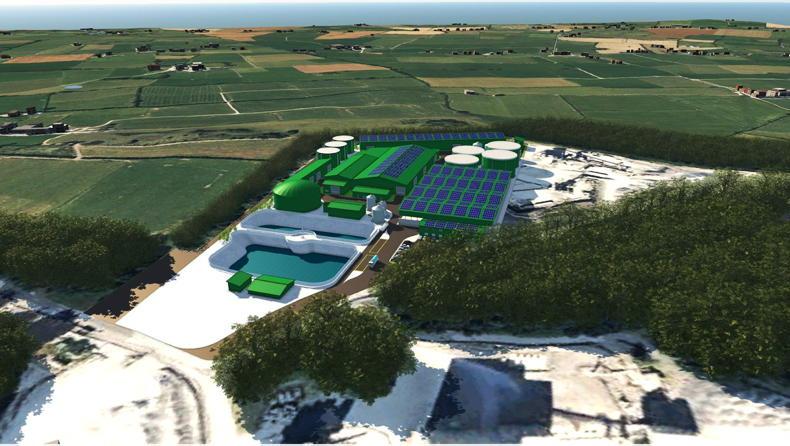

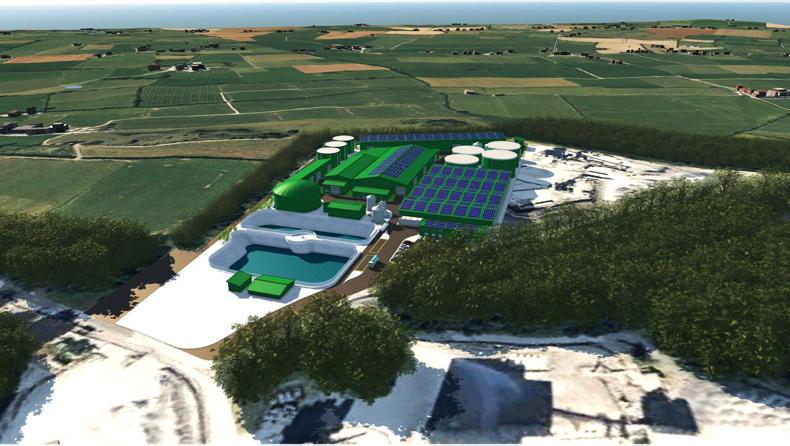
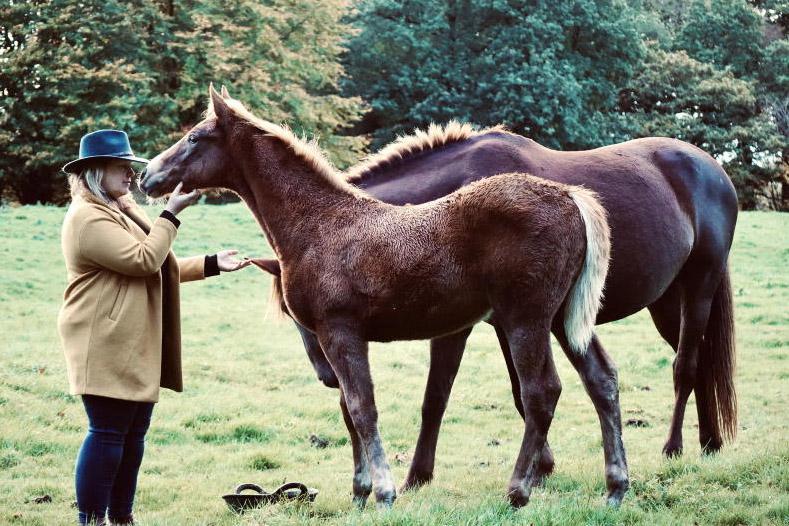
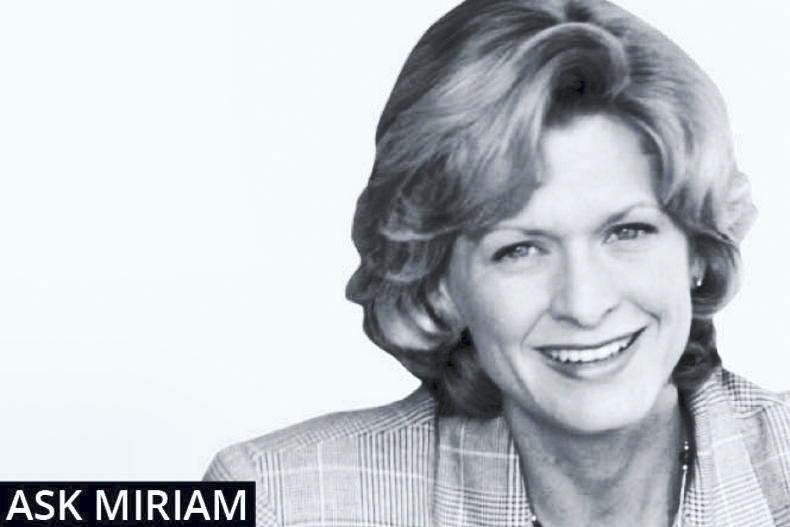
SHARING OPTIONS